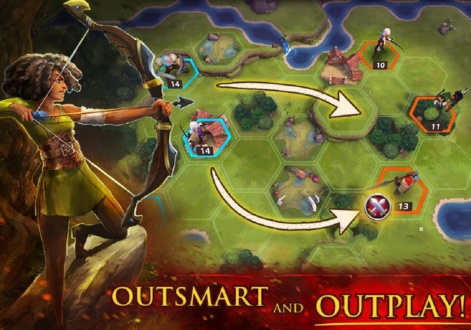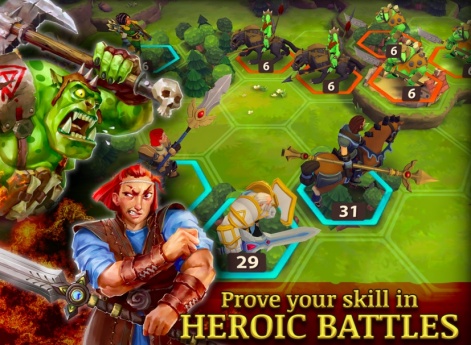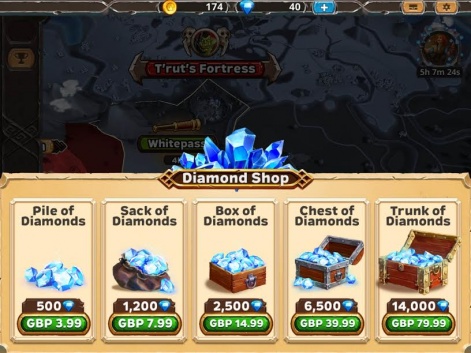Back in March, Berlin-based casual game developer Wooga took a step into the unknown by spinning off its own midcore studio Black Anvil Games.
“Casual games and midcore games are very, very different,” Wooga CEO Jens Begemann explained to PocketGamer.biz at the time.
“If you run it as one unit and one company culture, it's very difficult to become the best in both at the same time because they have different requirements.”
The studio's first project was Warlords, a turn-based strategy game. After a year-long testing period - boasting the best metrics of any Wooga soft launch to date - it launched at the end of September.
But shortly after, it was revealed to PocketGamer.biz that Black Anvil Games had been affected by the cuts and restructuring that saw Wooga direct its attention to casual.
The studio was unfortunately shut down, with Wooga and former Head of Studio Wilhelm Oesterberg parting company.
This is no reflection on the quality of the game, however, which remains live and is a polished, enjoyable strategy experience.
As such, PocketGamer.biz reached out to the game's Producer Kaspar Hübener to go behind the scenes on the game's development.
PocketGamer.biz: Tell us a little about the origins of the Warlords project. What were your inspirations?
When the project was initially pitched, the vision was to take the tactical depth and longevity from Heroes of Might and Magic and bring that to mobile.
The vision was to take the depth and longevity from Heroes of Might and Magic and bring it to mobile.Kaspar Hübener
What we envisioned was taking the goal of growing your army, a key part of Heroes of Might and Magic, and combining that with the dynamic world and player vs player focus of Boom Beach.
We wanted the end result to be deep, but still easily accessible, so we also spent a lot of time and effort on session structure and usability.
Was Warlords in development internally at Wooga before Black Anvil Games was established?
It was, for quite some time actually.
But as we were getting closer to got closer to launch we realised we needed to create something new, something that would reflect the team and the players we wanted to attract.
Wooga has made titles that aren’t arcade games but I think it would be fair to say they’re known as a creator of arcade, hidden object or simulation games.
So Black Anvil was a chance for us to establish our own identity and create something that would be appealing to players who grew up on games like Heroes of Might and Magic, or currently play titles like X-COM.
How experienced was the development team in midcore/strategy prior to this project? Coming from Wooga, was this new territory?
Wooga had actually produced a midcore title before, a game called Kingsbridge on Facebook, which unfortunately didn’t quite take off when it was released.
But there was certainly a level of experience gained from that project which paid off for Warlords.

And then there was experience gained outside of Wooga which certain members of the team brought to the team which really helped.
The team lead, Wilhelm, sums up this balance. He worked at Wooga on games like Monster World, which was a successful Facebook and mobile simulation game, but had also worked at DICE on the Battlefield franchise.
And then there were other team members who had worked at developers like Crytek, Telltale Games and Yager.
How large was the Warlords team, and how long did the entire development take?
At its peak, the Warlords team comprised around 30 people.
We hosted lunch time PvP sessions once a week in Wooga’s auditorium.Kaspar Hübener
Although, at the start of the project, we had a much, much smaller team who were focused on creating a playable, and fun, prototype that solely comprised the core turn-based hex-grid gameplay.
We hosted lunch time sessions once a week in Wooga’s auditorium where players faced off against each other in PvP battles over slices of pizza.
Even with the occasional dropout, the core game was a lot of fun and eventually the project became quite a bit bigger as we entered full production.
Wilhelm has said before that "something has gone wrong somehow" with games that feature autoplay. Why do you think this, and do you consider it a risk to develop a mobile strategy game without it in 2016?
It’s always a risk to break with current convention! But we felt it necessary with Warlords.
We see autoplay as an evolutionary, in-between, step that comes from an attempt to deal with old-school grinding in the relatively new environment of mobile free-to-play.
In traditional games, forcing players to grind was a way to stretch out the available content and to pace the progress of the most loyal and engaged players.
On mobile, though, long grind sessions don’t work well and from a developer’s perspective aren’t really necessary because we can use timers.

So that’s where autoplay comes in, allowing players to engage less with the more routine encounters in favour of spending their focus on the more challenging ones. For us, though, it never quite felt right playing this kind of game with autoplay.
In Warlords, we attempted to negate the need for autoplay by making your typical battle more playable - making it faster than autoplay - and more interesting by introducing several in-battle layers that make the battle result non-binary - such as changing victory conditions, persistent losses, in-battle loot and more.
The player decides if they spends 30 seconds in a battle or five minutes, optimising the outcome.Kaspar Hübener
The player decides if they spends 30 seconds in a battle or five minutes, optimising the outcome.
We hoped that this would shift the purpose of battles away from the “grind” bracket to the “challenging” bracket in the player’s mind.
Did the lack of autoplay create any extra challenges in terms of accessibility? How did you handle this?
In other games, autoplay is predominantly made available only once you’ve completed a level flawlessly.
Since players still need to beat every difficult level manually, autoplay doesn’t save them from having to understand the mechanics and acquire a certain amount of skill.
When it comes to micro-sessions and the ability to get some loot without having to commit to the dozens of inputs needed to complete a battle, we’ve relied on the simpler metagame features, such as free chests and Expeditions.
These allow the player to send off regiments for a certain time and then get loot back based on their power and the time they spent away.
Compared to many games labelling themselves 'midcore', Warlords errs much more on the core side. Was this your intention?
This is something we’ve learned from games in the past.
When going more for the core end of the spectrum, your audience shrinks, but those that remain are likely to have found something to be extremely excited about.
The risk of going too far in the “casual” direction is that you may end up with a game that just doesn’t come together and doesn’t really appeal to anyone.
You get either a very core-looking game that lacks the depth to retain the core users, or a too casual-looking game that then ambushes the audience with mechanics and depth that they weren’t looking for.
So, while trying to find that perfect balance, we made an active choice to come at it from the core direction.
Warlords was in soft launch for a year prior to its launch. What did you learn during this period, and what were the biggest changes you made as a result?
We really learned a lot during this long soft launch.
We felt it was a better game without the timers and the audience was sticking around longer.Kaspar Hübener
We also developed a lot of features and content during this period and ended up with a game probably twice the size in scope compared to the first soft launch version (not only in MB!).
Our small group of super-engaged players on our Warlords forum were hugely helpful in spotting problems and helping with fixes while giving feedback on our systems and feature designs.
One major change implemented based on the soft launch feedback was to remove all timers from regiment upgrades.
This was initially intended to provide a large part of the game’s timer squeezes and speed-up monetisation, something which was reflected in our data.
In the end though, we felt the game would be better without them. Once we made the change we were really happy with the results.
We felt it was a better game without the timers, and from our data, the audience was sticking around longer too.
How much iteration was there around the game's combat system? Was hex-based, turn-based strategy always the plan?
During the development of the game almost every system was revamped multiple times, or even replaced altogether.
The exception to this was the combat system, which remained intact all through production.

We iterated a lot on details of the combat such as the regiments’ special abilities, damage calculation, impact of terrain choices etc, but for the most part it stayed the same.
What was the biggest challenge you overcame during development?
It took us many iterations on the regiment progression in the meta-game until we reached the current system.
One thing that never changed was the initial vision of the game, which we always stuck to.Kaspar Hübener
We wanted to provide enough freedom for meaningful choices but still guarantee the characteristics of a regiment throughout the player’s progression.
Something else that was crucial over the course of the game’s development was building and maintaining the right team structure - finding the right specialties at the right time to help with development.
I think that’s key. One thing that never changed was the initial vision of the game, which we always stuck to.
How did the monetisation evolve throughout development? Why did you decide to keep the implementation of in-game ads so limited?
We focused first on creating a solid foundation of interlinked systems that was not only fun but also sustained strong monetisation for a long time.
Our intention from the start was to get this right and then build further monetisation mechanics on top of this foundation.

We applied a similar thought process to in-game ads. Introduce them at the most helpful and least obtrusive place first, and then, based on player reaction, expand on them from there.
Our expressed goal there was to make sure that ads would never come between an engaged player and their enjoyment of the game.
Traditionally, more core experiences enjoy higher conversion rates for paying users than their casual counterparts. Compared to Wooga games, have you found this to be the case so far?
Yes, we’re seeing that and also a higher ARPDAU - which was to be expected from a core game.
More generally, how happy have you been with the launch? Any surprises?
We were lucky to get good featuring from Apple and Google and are very happy with the amount of new players.
With Wooga’s current focus on more casual genres, we see Warlords as effectively feature complete.Kaspar Hübener
The game has received positive reviews from all over the world, but is especially well received in China and other Asian countries.
While core games do well there historically, and that’s not a huge surprise, we were very happy to see the same for Warlords.
What's next for Warlords?
The team is really proud that we were able to ship a polished game with most of the features we had envisioned in the early days of development, like PvP and PvE modes.
With Wooga’s current focus on more casual genres in mind, we see Warlords as effectively feature complete.
We’ll ensure that any bugs that pop up will be fixed, and we think that PvP seasons will keep players engaged for a long time to come.
A big shout out to the team for their hard work and of course to Warlords fans old and new who have given us a great response since we launched.





















